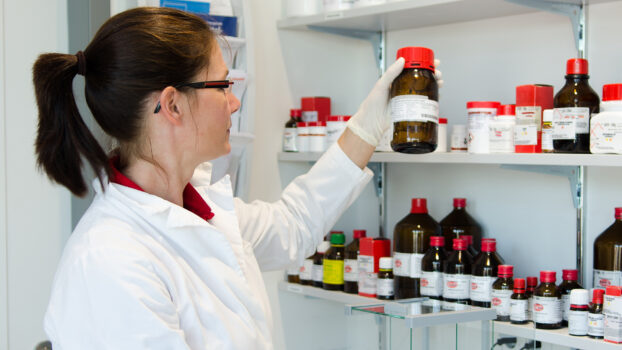Pharmacy
Pharmacy (state examination)

Experience science at first hand by studying pharmacy where you will conduct many practical experiments in the laboratory over the program duration of eight semesters. Pharmacy focuses on the development, manufacturing and quality assurance of drugs. Let your scientific curiosity blossom and be part of an industry that changes lives.
- Degree
- State examination (except teaching degree)
- Duration of studies in semester
- 8
- Start of degree program
- Winter semester
- Study location
- Erlangen
- Number of students
- 250-600
- Subject group
- Medicine, Health sciences, Mathematics, Natural sciences
- Teaching language
- completely in German
- Admission Requirements
- with NC (hochschulstart.de)
- Keywords
- Chemistry, Medications, Medicine, Pharmacology, Pharmacy, Bioactive Compounds
What is the degree program about?
Pharmacy is a scientific subject that focuses on the development, manufacturing and quality assurance of drugs, preparing and storing medicines, and the safe use and efficacy of drugs. Pharmacy has been practiced since ancient times and is among the oldest scientific disciplines.
Students who study pharmacy usually train to become pharmacists. However, pharmacy is a broad scientific program that also includes many other aspects of chemistry and biology related to drugs and human beings. Some aspects of physics and mathematics are also included in the program. If you like the sound of chemical reactions, pharmacy could be the right choice for you. Even though a large part of the degree program is theoretical, pharmacy is an applied degree program and there are many exciting hours in the laboratory ahead of you.
After all, once you finish the program you will be able to manufacture, analyze and evaluate all kinds of drugs. You will understand how and why drugs reach their target in the human body and understand the function of tablets, ointments and other preparations. Pharmacy opens the doors to several careers and you will have a great deal of choice in finding a direction that suits you.
-
Pharmacy is a scientific degree program that prepares students for a job in the pharmaceutical industry, in research, at pharmacies and government authorities.
Pharmacists are experts on medicines and have challenging tasks in the development, manufacturing quality control and dispensing of drugs.
The academic degree in pharmacy is concluded with the second State Examination after eight semesters of studying. Graduates can qualify as a licensed pharmacist when they have completed their final practical year after the second State Examination.
Pharmacists in industry and research usually require a doctoral degree with the title Dr.rer.nat, which usually takes three years to complete. Graduates may start their doctoral thesis during the practical year.
Pharmacy consists of two parts in the academic program and the final practical year.
In the first part of the program, students acquire a broad scientific education in general, inorganic, organic, physical, pharmaceutical and analytical chemistry (particularly inorganic, organic and instrumental analysis), in biochemistry, in biology (systematic and pharmaceutical botany), mathematics and physics (particularly experimental physics).
In the second part of the degree program, students deepen their knowledge in the development, acquisition and testing of drugs and preparations, and their biopharmaceutical behavior. Relationships between the chemical structure and effect of drugs and the mechanisms of physiological-chemical processes, molecular processes, as well as interactions between the components of different drug preparations are also considered in detail. Students can choose the following compulsory electives in the second part of the degree program:
- Pharmaceutical chemistry
- Pharmaceutical technology
- Pharmacology and toxicology
- Clinical pharmacy
- Pharmaceutical biology
-
- You should be interested in chemistry, biology and physics. Although you do not need to have more detailed knowledge than you will have obtained at school, any additional knowledge or practical skills that you have learned will make the start of the program easier for you.
- Due care and diligence are essential for a career where you will be working directly with medicines. It is very important that you already develop these skills while completing the practical exercises in your degree program and that you are able to analyze your results critically.
-
Most pharmacists (around 85 percent) work in pharmacies or hospital pharmacies. As pharmacy is a particularly interdisciplinary field, graduates are also ideally qualified for other professions:
- In teaching and research at universities and external research institutions
- In the pharmaceutical industry (research, manufacturing, approval, analysis)
- Health authorities and monitoring agencies (for example forensic analysis, environmental protection, narcotic and residue analysis)
-
Information on the recognition of academic achievements can be found here.
-
- Admission requirements (first semester)
- with NC (hochschulstart.de)
- Admission requirements (higher semester)
- Admission not currently possible
- Application deadline winter semester
-
31.05.
- Details and notes
-
In contrast to many other degree programs, applicants for the pharmacy program need to apply on hochschulstart.de, rather than directly applying to FAU. The degree program is subject to admission restrictions (applicable throughout Bavaria). The degree program may only be started in the winter semester. Applications must be received by July 15 if you completed your Abitur in the current year or May 31 if you completed your school examinations before the current year.
Do you need help or more information?
Our Student Advice and Career Service (IBZ) is the central point of contact for all questions about studying and starting a degree programme. Our Student Service Centres and subject advisors support you in planning your studies.